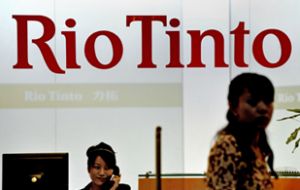MercoPress. South Atlantic News Agency
Four Rio Tinto executives admit taking bribes to a court in Shanghai
 A possible lead case for business relations with China
A possible lead case for business relations with China Four executives of mining giant Rio Tinto have admitted to a court in the Chinese city of Shanghai that they took bribes, officials have said. Lawyers for the men - Australian Stern Hu and three Chinese colleagues - said they admitted accepting some money but are disputing the amounts.
The group, arrested in July also faces charges of commercial espionage. The charges will be heard on Tuesday behind closed doors, despite Australian government objections.
Foreign reporters are not allowed to attend the trial, which is expected to last for three days.
Stern Hu - charged, according to reports, with accepting bribes of about 900,000 US dollars- was Rio Tinto's lead negotiator in the talks with Chinese steel mills to try to settle a price for China to buy iron ore from Australian mining companies.
He and three of his Chinese colleagues - Liu Caikui, Ge Minqiang and Wang Yong - have been held in detention since they were arrested at their homes on 5 July last year.
If convicted on commercial espionage and bribery charges they face lengthy jail terms under Chinese law.
Tom Connor, the Australian consul-general in Shanghai, told journalists that Mr Hu “did acknowledge the truth of some of those bribery amounts”.
The other men also admitted accepting money but were contesting the amounts alleged, their lawyers said. One of the men, Wang Yong, denies taking a 9 million bribe.
The BBC's China correspondent, Damian Grammaticas, says that the admissions come as a surprise because Rio Tinto had said that its four employees had done nothing wrong.
Speaking as the trial opened, Rio Tinto's chief executive, Tom Albanese, said that the company remained committed to strengthening ties with China.
The case was “obviously of great concern to us”, he told a forum in Beijing. “I can only say we respectfully await the outcome of the Chinese legal process.”
A month before the group were arrested, Rio Tinto scrapped a 19.5 billion USD deal with China's state-owned Chinalco in favour of a tie-up with rival giant BHP Billiton, which angered some in Beijing. But ties have since improved - last week Rio Tinto signed a deal with Chinalco to develop a massive iron ore mine in Guinea.
On Tuesday, the court will address the commercial espionage charges.
The Australian Department of Foreign Affairs and Trade has said it is disappointed with the Chinese court's decision not to allow its consular officials to attend this part of the trial, saying it had “registered” the Australian government's concern with Chinese officials in Beijing and Canberra.
Officials said Mr Hu's lawyer, Duan Qihua, would be present throughout the trial.
Australian Prime Minister Kevin Rudd told reporters on Monday that his government would be “monitoring the trial very carefully”. He spoke after Chinese officials warned Australia against “politicising” the case last week.
China relies heavily on mining giants like Rio Tinto to feed its huge appetite for raw materials to power its economy.
The BBC correspondent says that other foreign firms are watching the Rio trial closely.
The case has made many foreign businesses in China nervous about what information could be treated as commercially or politically sensitive.
China's laws on the subject are opaque and courts are often seen as lacking in independence. The trial also comes as a growing number of foreign businesses say they are facing problems operating in China.
A survey of US businesses, released as the Rio Tinto trial began, showed a third said were discriminated against compared to their Chinese rivals by the legal and regulatory system. (BBC).-




Top Comments
Disclaimer & comment rulesCommenting for this story is now closed.
If you have a Facebook account, become a fan and comment on our Facebook Page!